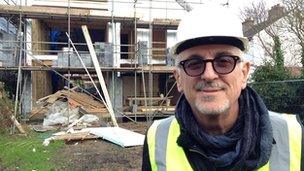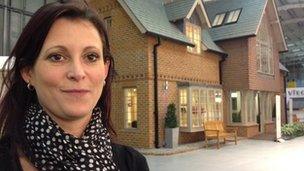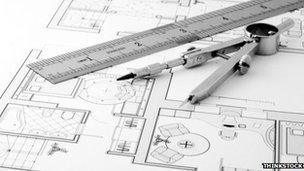Self-builders keen to spread the word
- Published

Terry Moore is organising the building of his five bedroom house
Which of us hasn't fantasised about a new house, exactly as we want it?
You know the sort of thing: swimming pool in the garden, 'his and hers bathrooms', or even a home cinema.
Well, such dreams may not be as far-fetched as you think, because around 15,000 people a year are now building their own homes.
Most buy a plot of land, then hire architects and builders to do all the physical work for them.
By avoiding the large profit margins of developers, they can save tens of thousands of pounds.
And it does not need to be a grand design. Most self-built houses are perfectly ordinary homes, which would not be out of place on a modern housing estate.
'Blank canvas'
"Ever since I was given a Meccano set, I could never stop building things," says Terry Moore, as he watches his five bedroom house take shape on a quiet suburban street in Surrey.
The house will have five en-suite bathrooms, an internal garden, and even trees in the hallway.
Mr Moore is a design consultant, so had some experience of architects and builders, but this is the first building he has ever been responsible for himself.
"Anyone can do it," he says. "There is so much advice out there in the market."
His first motivation was the design.
"Every time you look at buying a property, you are compromising. And when you are building your own, you do not have to compromise. You've got a blank canvas and you do exactly what you want."
But he says the most noticeable benefit has been the cost.
By cutting out the developers, he estimates that he is saving between 20% and 30% compared to building in the conventional way.
It can also be cheaper to buy your own materials than do it through a builder, with good deals said by some to be available on the internet.
One conventional supplier even offers a 25% discount to anyone who is building their own home.
Huge risk?
But this approach is not for the faint-hearted.

Rachel Pyne says that cashflow must be a key consideration for self-builders
Tales abound of disappearing builders, angry neighbours, and planning nightmares.
Some of those who decide to take the plunge are being helped by a community-owned advice centre in Swindon, Wiltshire, which offers advice on everything from finding a building plot to insulation or timber frames.
The National Self-Build and Renovation Centre contains a whole house, and sections of several more under its roof.
Above all, there is help here on how to pay for the whole thing.
Rachel Pyne, of Buildstore Financial Services, advises anyone building a house themselves to think very carefully about cashflow.
"If you finish a stage, and you don't have the funds to pay your builder, he's not likely to continue with the next stage. So if there's a big delay, he might go off and get another job," she says.
She also advises on specialist types of mortgage, which pay out money in stages.
Lenders want to be certain that the foundations have been properly laid, for example, before giving out the next tranche of cash.
But some lenders, particularly the banks, see self-build houses as a huge risk.
She says it is often building societies which are more sympathetic to lending money to self-builders.
Insurance considerations
Experts warn of other dangers too.

Many considerations are required before starting to build you own home
By being the project manager of a building site, you actually become an official employer.
That means you are responsible for the safety of any contractors that come onto the site, so you will need public liability insurance in case of any accidents.
You will also need to take out an insurance policy to cover the theft of building materials or machinery from the site, which could prove very expensive.
And that is before you start looking at the structural warranties you will need on the building itself.
But it is not only budgeting skills you will need.
Self-builders have to manage a team of surveyors, architects, builders and suppliers, not to mention being a diplomat with the new neighbours.
"You do need people management skills," says Kate Faulkner, of the consultancy Designs on Property.
"Things go wrong: cars break down, vans break down, stuff gets stolen off-site. And you have to be able to deal with these issues. So you have to be sympathetic, but you also need to be quite motivational."
'Next time'
Despite cheaper land and lower labour costs during the recession, the number of people building their own houses has not increased dramatically. Kate Faulkner puts it at between 15,000 and 20,000 every year.
But, according to Garry Dyke, of Lowfield Timber Frames in Welshpool, it has got easier for ordinary people to get involved.
"When I first started, 10 years ago, you employed a builder, who sourced all the materials. Now it's an attractive proposition for the average professional couple," he says.
Back in the muddy garden of his new house, Terry Moore says he is hoping to move his family in by Easter next year.
And he explains the basic arithmetic that any self-builder finds tempting.
"In a conventional build the land costs 30%, the construction costs 30%, and the developers make a 30% profit," he says.
It probably explains why he has now started using the phrase "next time we do this…".
In other words, it sounds like building your own house can become seriously addictive.